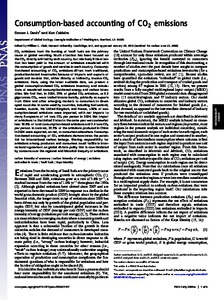Consumption-based accounting of CO2 emissions

Davis, Steven J. ; Caldeira, Ken
Proceedings of the National Academy of Sciences of the United States of America
2010
107
12
5687-5692
carbon dioxide ; climate change ; consumption ; international agreement ; trade
Energy
English
Bibliogr.
"CO(2) emissions from the burning of fossil fuels are the primary cause of global warming. Much attention has been focused on the CO(2) directly emitted by each country, but relatively little attention has been paid to the amount of emissions associated with the consumption of goods and services in each country. Consumption-based accounting of CO(2) emissions differs from traditional, production-based inventories because of imports and exports of goods and services that, either directly or indirectly, involve CO(2) emissions. Here, using the latest available data, we present a global consumption-based CO(2) emissions inventory and calculations of associated consumption-based energy and carbon intensities. We find that, in 2004, 23% of global CO(2) emissions, or 6.2 gigatonnes CO(2), were traded internationally, primarily as exports from China and other emerging markets to consumers in developed countries. In some wealthy countries, including Switzerland, Sweden, Austria, the United Kingdom, and France, >30% of consumption-based emissions were imported, with net imports to many Europeans of >4 tons CO(2) per person in 2004. Net import of emissions to the United States in the same year was somewhat less: 10.8% of total consumption-based emissions and 2.4 tons CO(2) per person. In contrast, 22.5% of the emissions produced in China in 2004 were exported, on net, to consumers elsewhere. Consumption-based accounting of CO(2) emissions demonstrates the potential for international carbon leakage. Sharing responsibility for emissions among producers and consumers could facilitate international agreement on global climate policy that is now hindered by concerns over the regional and historical inequity of emissions."
Digital
The ETUI is co-funded by the European Union. Views and opinions expressed are however those of the author(s) only and do not necessarily reflect those of the European Union or the ETUI.